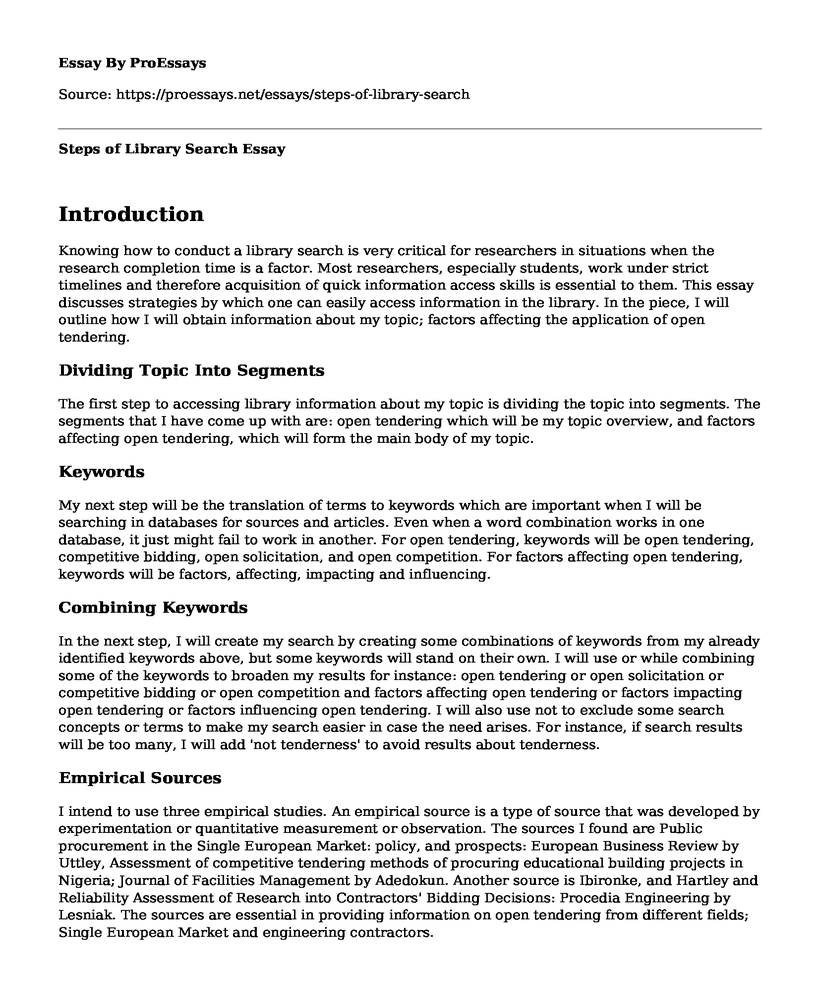Introduction
Knowing how to conduct a library search is very critical for researchers in situations when the research completion time is a factor. Most researchers, especially students, work under strict timelines and therefore acquisition of quick information access skills is essential to them. This essay discusses strategies by which one can easily access information in the library. In the piece, I will outline how I will obtain information about my topic; factors affecting the application of open tendering.
Dividing Topic Into Segments
The first step to accessing library information about my topic is dividing the topic into segments. The segments that I have come up with are: open tendering which will be my topic overview, and factors affecting open tendering, which will form the main body of my topic.
Keywords
My next step will be the translation of terms to keywords which are important when I will be searching in databases for sources and articles. Even when a word combination works in one database, it just might fail to work in another. For open tendering, keywords will be open tendering, competitive bidding, open solicitation, and open competition. For factors affecting open tendering, keywords will be factors, affecting, impacting and influencing.
Combining Keywords
In the next step, I will create my search by creating some combinations of keywords from my already identified keywords above, but some keywords will stand on their own. I will use or while combining some of the keywords to broaden my results for instance: open tendering or open solicitation or competitive bidding or open competition and factors affecting open tendering or factors impacting open tendering or factors influencing open tendering. I will also use not to exclude some search concepts or terms to make my search easier in case the need arises. For instance, if search results will be too many, I will add 'not tenderness' to avoid results about tenderness.
Empirical Sources
I intend to use three empirical studies. An empirical source is a type of source that was developed by experimentation or quantitative measurement or observation. The sources I found are Public procurement in the Single European Market: policy, and prospects: European Business Review by Uttley, Assessment of competitive tendering methods of procuring educational building projects in Nigeria; Journal of Facilities Management by Adedokun. Another source is Ibironke, and Hartley and Reliability Assessment of Research into Contractors' Bidding Decisions: Procedia Engineering by Lesniak. The sources are essential in providing information on open tendering from different fields; Single European Market and engineering contractors.
Systematic Sources
Systematic reviews, conversely, refers to sources developed from a process of appraising and synthesizing of first-hand research papers by use of a methodology that is clearly and rigorously documented both in the studies selection and the strategy of the search. Unlike the empirical sources, they were easy to find. The sources found under this category are Public procurement strategy for accelerating the economic recovery: Supply Chain Management: An International Journal by Gordon Murray and A review of contractor selection practice in the UK construction industry: Building and Environment by Holt et al.
Cite this page
Steps of Library Search. (2022, Apr 15). Retrieved from https://proessays.net/essays/steps-of-library-search
If you are the original author of this essay and no longer wish to have it published on the ProEssays website, please click below to request its removal:
- The Notion of Truth Values in Semantics
- Essay Sample on Extracurricular Involvement and GPA
- Dress-Codes Applications in the US and the Negative PR Impact on Schools
- Essay Sample on Student Government
- Paper Example on Ethical Principles of Coventry University
- Essay on Quantitative Risk Assessment: Benefits for Organizational Assets & Stakeholders
- Paper on Interns Should Be Paid For Their Work







